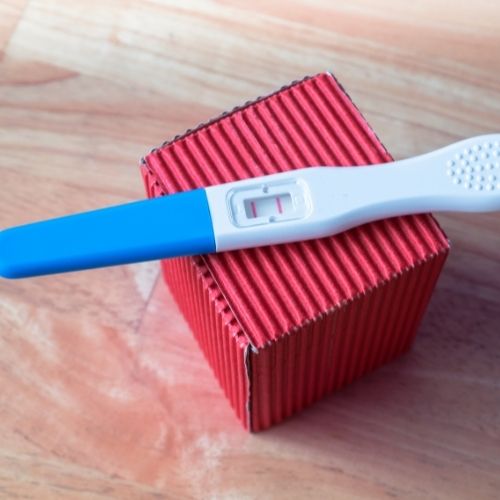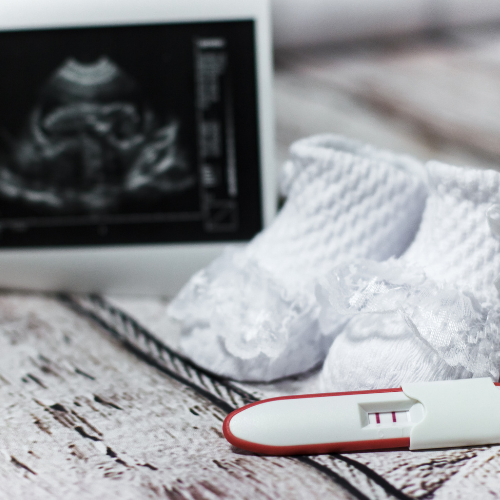How soon can you find out if you’re pregnant? It’s a question that buzzes through the mind of many people.
There are a few different ways to find out if you’re pregnant, and each of them has a different time period for when it can detect pregnancy. If you’re testing before a missed period, you may not have any pregnancy symptoms yet.
Luckily, you won’t have to wait around to see if you’ll be blessed with the terrible morning sickness or sore breasts. There are blood tests and urine tests readily available!
How soon can you find out if you are pregnant?
Pregnancy tests look for the pregnancy hormone called human chorionic gonadotropin, or HCG. This hormone is produced when a fertilized egg implants in the uterine wall, usually around 6-8 days after ovulation and fertilization.
If you know when you ovulated, you will be able to test sooner than if you are unsure about your ovulation date. You may see a positive result as early as 10-14 days after ovulation. There are many types of pregnancy tests, but all of them can detect pregnancy pretty early. The main types of pregnancy tests are urine tests and blood tests.
Home pregnancy tests
Home tests are very accurate, with some being more sensitive than others. Home pregnancy tests are a urine test, meaning you’ll pee into a cup or put the end of the test in the urine stream, place it on a flat surface, and wait a few minutes to see if it turns positive. There are some pregnancy tests that can tell you if you’re pregnant 1-2 days before a missed period, while others encourage you to wait until you are due for your menstrual cycle. That means they usually won’t read positive until 13-15 days after ovulation.
A urine pregnancy test will show two lines or a ‘+’ sign to indicate it’s a positive pregnancy test. If it is a negative test, you will just see one line. This line is called the control line and exists to show that it is a valid, working pregnancy tests. Pregnant tests that do not have a control line will give an inaccurate result.

A home pregnancy test kit usually comes with between 1-3 tests. If you have negative tests on the first day, you may wish to repeat the test in a few days. It is possible that the levels of HCG were low on the first test but are higher in a few days. HCG levels double every 48 hours in early pregnancy, so retesting in a few days is a good way to be sure.
Many home test kits will tell you to use your first morning urine. This is because the levels of HCG will be higher in the morning urine, so you are more likely to get a early positive. Be warned: you could get a false negative result. If you start showing early signs of pregnancy, like nausea or tender breasts, you may want to try again with a new test strip or call the doctor’s office.
Urine pregnancy tests
The urine pregnancy tests at the doctor’s office are very similar to home tests. Like with home tests, the healthcare provider will collect a urine sample and dip a test strip into it. After waiting a certain amount of time, they will see if there are 1 or 2 lines present.
In rare cases, you will get a false positive or a false negative. Many providers will also send for a HCG blood test to confirm the pregnancy as it is most accurate.
Pregnancy blood test
Ordered by a health care provider, such as your OB/GYN or midwife, a blood pregnancy test is done at a lab. Like the urine test, these tests are looking for the levels of HCG in the blood. Also called a quantitative HCG test, your provider will get an accurate reading with the exact amount of HCG. A quantitative blood test is the most accurate way to get pregnancy test results. Your doctor or midwife may recommend repeating the test in a few days to make sure the levels are still trending upwards which can be indicative of a healthy pregnancy.

HCG levels can be detected in the blood sooner than they can be detected in the urine. Blood tests are much more sensitive than urine tests and may detect a pregnancy as soon as a week after ovulation. That being said, many providers will not order a blood test until you have missed period. They may order other hormone levels, like progesterone, at the same time.
Next steps after a positive pregnancy test
After you get a positive pregnancy test, you should start taking a prenatal vitamin with folic acid if you are not already. Research has found that folic acid supplements lower the incidence of neural tube defect and other health conditions of the fetus.
Your doctor or midwife will also schedule a prenatal care visit. They will want to do a physical exam a pelvic exam, and get your health history. They will want to know your baseline health status and any medical conditions so they can monitor if another health problem arises during pregnancy such as high blood pressure. Your doctor’s office should also discuss your individual risk factors for the pregnancy.
Your doctor may schedule an ultrasound to make sure the pregnancy is located in the uterus and not the fallopian tube. A pregnancy in the fallopian tube is called an ectopic pregnancy and poses great danger to both the pregnant woman and the fetus. This ultrasound is sometimes done around the 8 week mark. Later in the pregnancy, your doctor or midwife may recommend another ultrasound to look for birth defects and your baby’s anatomy, but the first ultrasound is usually just done to check the due date and location of the pregnancy.

Due date
Your doctor or midwife will also help you calculate your due date. Your due date is often calculated based off of the date of your last period. In some cases, it can be based off of an initial ultrasound done in the first trimester.
Early stages of pregnancy
As the level of HCG rises, you may start feeling some symptoms of pregnancy. Common early symptoms of a normal pregnancy may include:
- Nausea
- Vomiting
- Bloating
- Fatigue
- Breast tenderness
- Swollen breasts
- Increased urination
- Lights spotting, possibly implantation bleeding
- Cramping
- Food or smell aversions
It is important to note than not everyone develops these symptoms. You may experience none, some, or all of them. Everyone’s body reacts a bit different to the HCG hormone and pregnancy!
Related post: Bleeding After Cesarean: What’s Normal?

